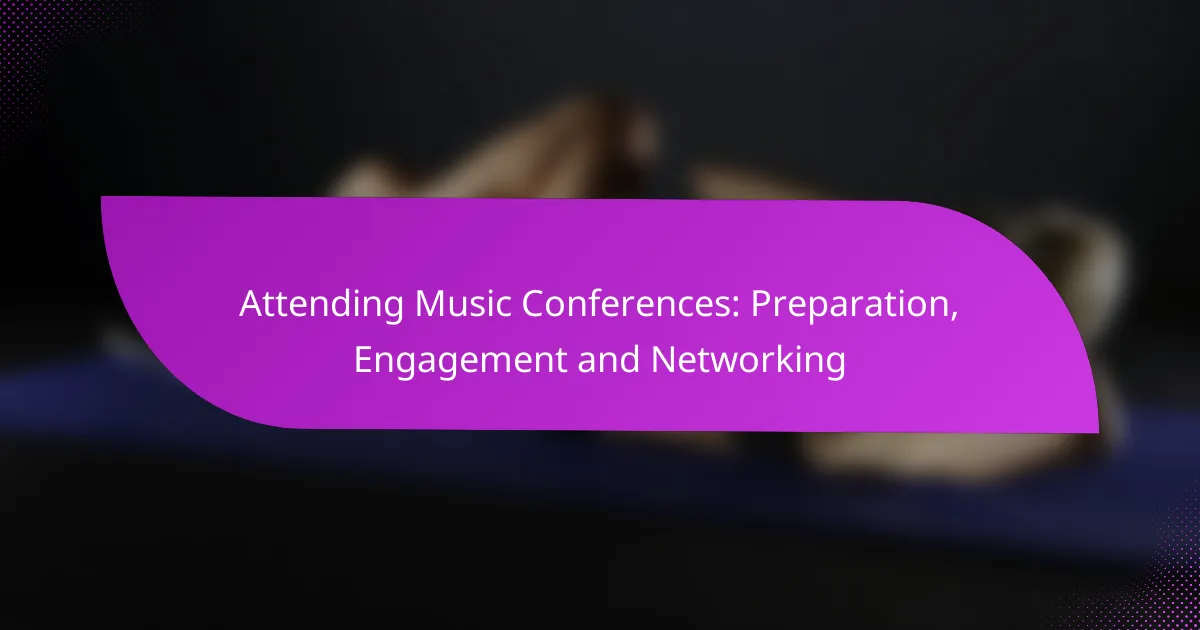Attending music conferences offers a unique opportunity to enhance your industry knowledge and expand your professional network. By preparing strategically, engaging actively, and fostering genuine connections, you can maximize the benefits of these events. Whether through educational sessions or social media interactions, effective participation can lead to valuable collaborations and insights in the music business.
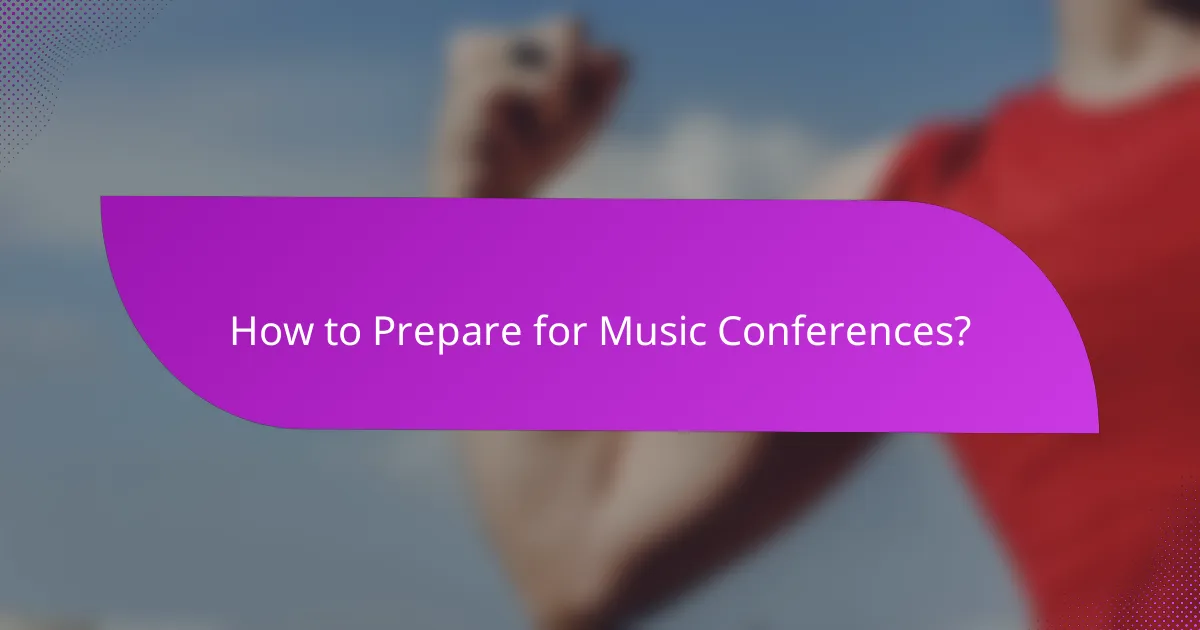
How to Prepare for Music Conferences?
Preparing for music conferences involves thorough planning and strategic engagement to maximize networking opportunities and learning experiences. Key steps include researching the agenda, setting networking goals, and organizing travel logistics.
Research conference agendas
Understanding the conference agenda is crucial for effective preparation. Review the schedule to identify key sessions, workshops, and panels that align with your interests and professional goals.
Pay attention to the speakers and their backgrounds, as this can help you formulate questions and topics for discussion. Make a list of must-attend events to ensure you make the most of your time.
Set clear networking goals
Establishing clear networking goals can enhance your conference experience. Determine what you hope to achieve, whether it’s connecting with industry leaders, finding potential collaborators, or expanding your professional circle.
Consider setting specific targets, such as meeting a certain number of new contacts or scheduling follow-up conversations. This focus will guide your interactions and help you stay on track.
Prepare promotional materials
Having promotional materials ready is essential for making a strong impression. Create business cards that clearly display your contact information and professional branding.
Additionally, consider preparing a one-sheet or digital portfolio showcasing your work, achievements, and services. This can serve as a conversation starter and provide a tangible reference for potential connections.
Schedule meetings in advance
Scheduling meetings in advance can significantly enhance your networking effectiveness. Reach out to potential contacts before the conference to arrange specific times to meet.
Utilize social media platforms or the conference app to connect with attendees and set up appointments. This proactive approach ensures you maximize your time and meet key individuals.
Plan travel and accommodations
Effective travel and accommodation planning is vital for a smooth conference experience. Book your travel well in advance to secure the best rates and availability, especially if the conference is in a popular location.
Choose accommodations that are conveniently located near the conference venue to minimize travel time. Consider factors like transportation options and nearby amenities to enhance your stay.
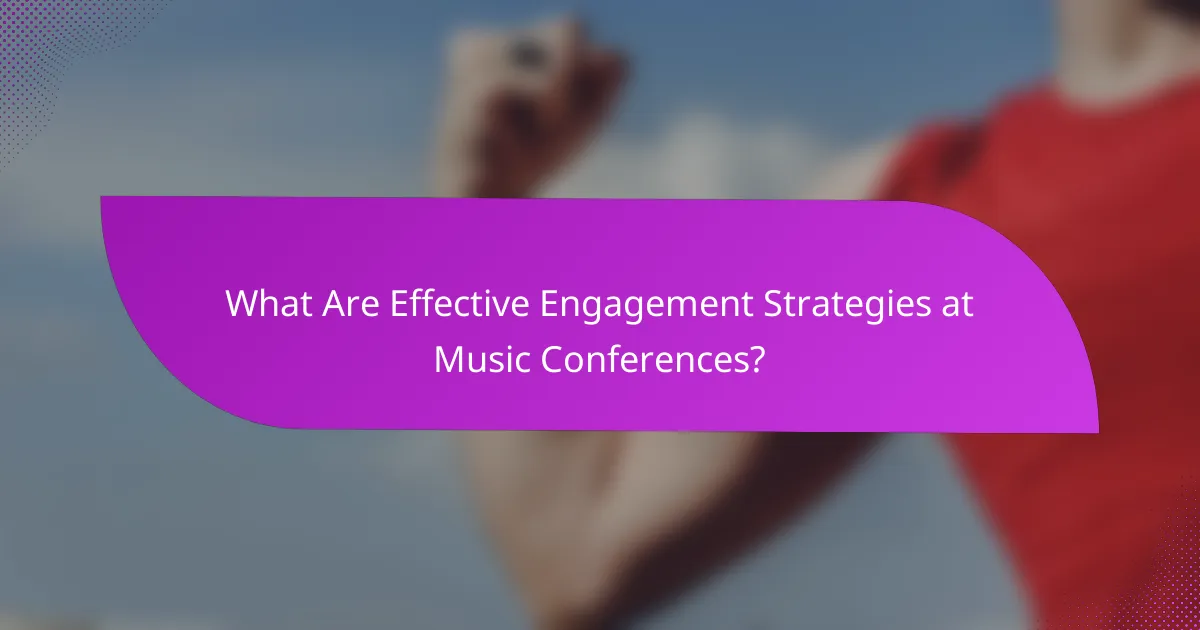
What Are Effective Engagement Strategies at Music Conferences?
Effective engagement strategies at music conferences include active participation, leveraging social media, attending educational sessions, and interacting with exhibitors. These approaches enhance networking opportunities and deepen your understanding of industry trends.
Participate in panel discussions
Engaging in panel discussions allows you to share insights and ask questions directly from industry experts. Prepare by researching the panelists and formulating thoughtful questions that reflect your interests and expertise.
Consider volunteering as a panelist if you have relevant experience. This can significantly raise your profile and establish you as a knowledgeable figure in your niche.
Utilize social media for live updates
Using social media during conferences helps you share real-time insights and connect with attendees. Platforms like Twitter and Instagram are ideal for posting updates, quotes, and photos, which can attract attention from fellow participants.
Use specific hashtags related to the conference to increase visibility and engage with others discussing similar topics. This can lead to new connections and opportunities for collaboration.
Attend workshops and breakout sessions
Workshops and breakout sessions provide hands-on learning experiences tailored to specific interests. These smaller groups often foster deeper discussions and allow for more personalized interactions with speakers and attendees.
Prioritize sessions that align with your professional goals or areas where you seek to improve. Take notes and actively participate to maximize your learning and networking potential.
Engage with exhibitors
Interacting with exhibitors is crucial for discovering new products and services relevant to the music industry. Approach booths with specific questions and express genuine interest in their offerings to create meaningful conversations.
Collect business cards and follow up after the conference to maintain connections. This can lead to potential partnerships or collaborations that benefit your career.
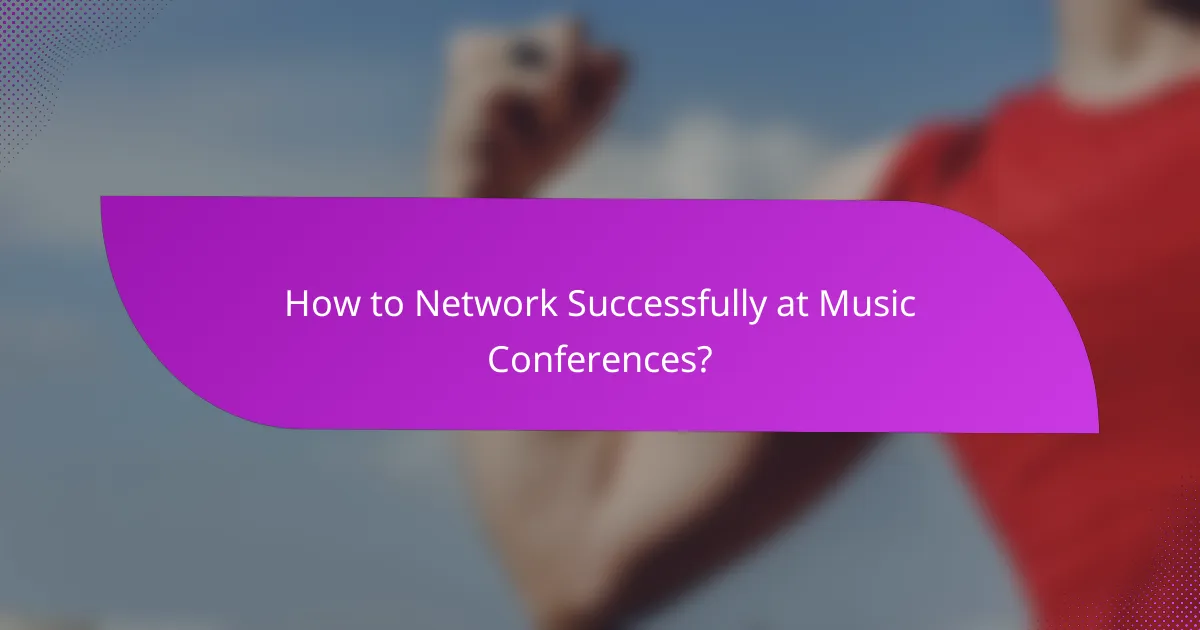
How to Network Successfully at Music Conferences?
Networking successfully at music conferences involves building genuine connections and following up effectively. Engaging with industry professionals can lead to valuable opportunities, collaborations, and insights into the music business.
Follow up with contacts post-conference
Following up with contacts after a conference is crucial for maintaining the relationships you’ve built. Aim to reach out within a week of the event, referencing specific conversations to jog their memory. A simple email or message expressing appreciation for their time can go a long way.
Consider scheduling a brief call or coffee meeting to discuss potential collaborations or share ideas. This personal touch reinforces your interest and helps solidify the connection.
Utilize LinkedIn for connections
LinkedIn is a powerful tool for expanding your professional network in the music industry. After meeting someone at a conference, send them a connection request with a personalized note that mentions your interaction. This helps them remember who you are and why you connected.
Engage with their posts and share relevant content to stay on their radar. Regular interaction can lead to more meaningful connections and opportunities down the line.
Join conference-related groups
Joining groups related to the conference can enhance your networking efforts. Many conferences have dedicated online communities where attendees can share insights, ask questions, and collaborate. Participating in these groups keeps you engaged with industry trends and connects you with like-minded professionals.
Look for groups on platforms like Facebook or LinkedIn, and actively contribute to discussions. This visibility can lead to new connections and potential partnerships.
Exchange business cards effectively
Exchanging business cards is a traditional yet effective networking method at conferences. Ensure your business card includes essential information such as your name, title, company, and contact details. Consider adding a QR code that links to your portfolio or social media profiles for easy access.
When exchanging cards, take a moment to discuss your interests or projects to create a memorable interaction. Store the cards in a dedicated pocket or holder to keep them organized and easily accessible for follow-ups later.
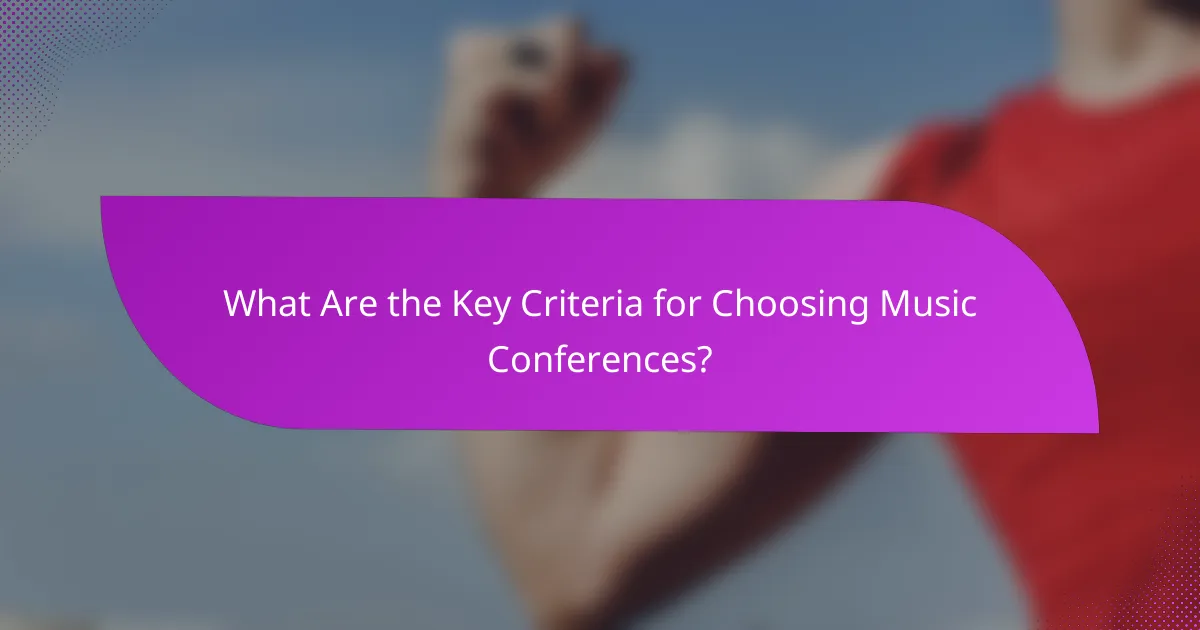
What Are the Key Criteria for Choosing Music Conferences?
Choosing the right music conference involves assessing several key criteria that align with your professional goals and interests. Focus on the relevance of the industry, the quality of the speakers, and the location’s accessibility to ensure a valuable experience.
Assess industry relevance
Industry relevance is crucial when selecting a music conference. Look for events that cater to your specific niche, whether it’s music production, marketing, or performance. Conferences that align with your career stage and aspirations will provide the most applicable insights and networking opportunities.
Consider the themes and topics covered at the conference. If a conference emphasizes emerging trends or technologies in music, it may be more beneficial for those looking to innovate in their field. Research past events to gauge their focus and attendee demographics.
Evaluate speaker lineups
The quality of the speaker lineup can significantly impact the value of a conference. Look for industry leaders, successful artists, and influential figures who can share their experiences and insights. A diverse lineup can also provide various perspectives on current industry challenges.
Check if the speakers have a track record of engaging presentations and relevant expertise. Reading reviews or watching past talks can help you determine if their sessions will be worth your time. Prioritize conferences that feature speakers you admire or wish to learn from.
Consider location and accessibility
The location of a music conference plays a vital role in your decision-making process. Choose a venue that is easily accessible by public transport or has ample parking options. Consider the overall environment and amenities available in the area, such as accommodations and dining options.
Factor in the costs associated with travel and lodging, as these can vary significantly by location. If a conference is held in a major city, expect higher expenses, but also potentially greater networking opportunities. Research local regulations or requirements, especially if traveling internationally, to avoid any last-minute issues.
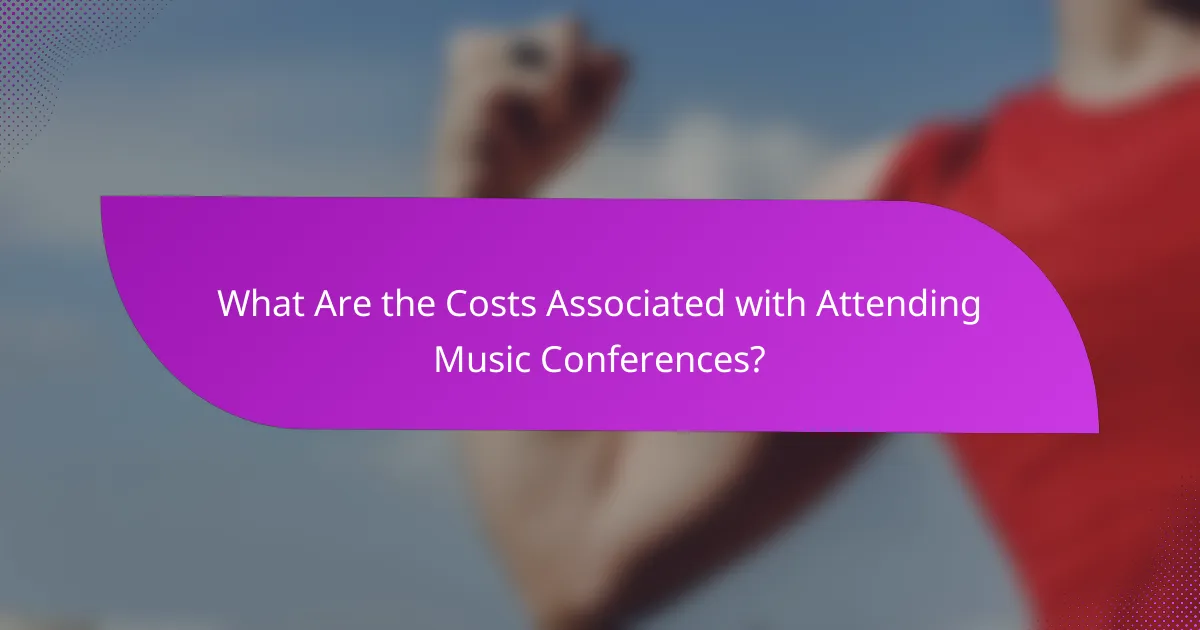
What Are the Costs Associated with Attending Music Conferences?
Attending music conferences involves several costs, including registration fees, travel expenses, accommodation, and additional costs for meals and networking events. Understanding these expenses can help you budget effectively and make the most of your conference experience.
Registration fees
Registration fees for music conferences can vary widely, typically ranging from a few hundred to over a thousand USD, depending on the event’s scale and prestige. Early bird discounts are often available, so registering well in advance can save you money.
Some conferences offer tiered pricing based on attendee categories, such as students, professionals, or industry veterans. Be sure to check if you qualify for any discounts and consider the value of what each registration tier includes, such as access to workshops or exclusive sessions.
